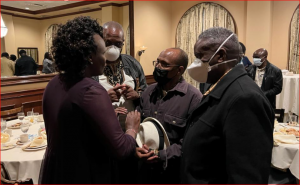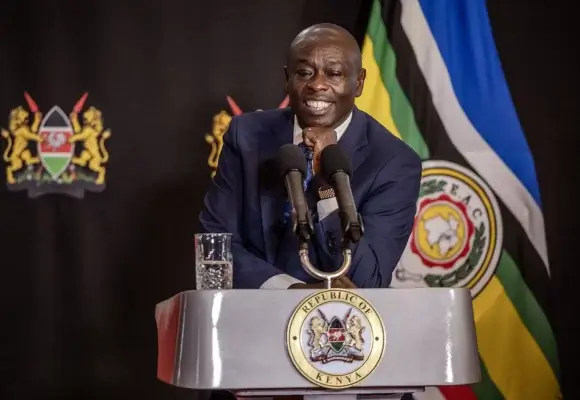|
LISTEN TO THIS THE AFRICANA VOICE ARTICLE NOW
Getting your Trinity Audio player ready...
|
The Kenyan High Court has ruled in favor of the petitioner, activist Okiya Omtatah Okoiti, that Kenyans in the diaspora should be allowed to register as voters using valid passports and original national identity cards, a major victory for diaspora groups outside Africa.
Omtata filed the petition and named the Attorney General and Independent Electoral and Boundaries Commission (IEBC) as the respondents.
Diaspora vote advocate Jerotich Seii was the first to announce the ruling on her Twitter account creating excitement within the diaspora community.
Here are the rulings:
In the end, the Notice of Motion dated January 5 2022, is hereby determined as follows.
-
Pending the hearing and determination of the petition herein, a Kenyan citizen residing outside Kenya shall apply for registration as a voter upon production of a valid Kenyan Passport or upon the production of an original national identity card.
-
The Independent Electoral and Boundaries Commission shall forthwith accord an opportunity to the Kenyan citizens residing outside Kenya to apply for registration as voters upon production of valid Kenyan passports or upon production of original national identity cards.
The Court presided by Justice Anthony Mrima, ordered to accept both valid passports and original IDs, also known as kitambulisho, as documents that can be used to register to vote.
In response to the Court order, IEBC Acting CEO Marjan Hussein Marjan sent out an internal memo directing his diaspora staff to comply with the order.
Citing section 82 (1) e in the Kenyan Constitution, which deals with election legislation:
Parliament shall enact legislation to provide for–
(e) the progressive registration of citizens residing outside Kenya, and the progressive realization of their right to vote.
Marjan said the Kenyan “Constitution leaves no doubt that the right to vote by Kenyans in the diaspora is to be realized progressively.”
Some diaspora leaders have accused IEBC of acting in bad faith by taking advantage of the broadness and ambiguity of the term “progressive registration” to slow-walk the granting of Kenyans overseas their right to vote.
Marjan instructed his team to comply with the court order by:
“Allowing every eligible Kenyan citizen residing outside Kenya to be registered as a voter so long as they furnish the registration officer with a valid Republic of Kenya passport of national identity card.”
In his press conference on January 7, 2022, in Naivasha, IEBC Chairman Wafula Chebukati announced that diasporans residing around Kenya could use valid passports and national identity cards, and those living in the US, Europe, and the Middle East, could only use a valid passport.
Chebukati, however, did not explain why the diaspora groups in Africa and those outside Africa had different registration requirements.
For her part, IEBC argued allowing diasporans to use national identification cards could compromise the integrity of the elections because those IDs don’t have expiration dates, and Kenyans who relinquished their citizenship could easily register and vote.
But the Court trashed the IEBC argument, for now.
“This Court believes that Kenya as a country has the requisite machinery and ability to ascertain whether any of its citizens ever relinquished their citizenship.”
Diaspora groups should not pop the champagne yet, the Court has not made the final decision on the petition, and while diasporans might be allowed to register using the national IDs if the ruling is reversed, those who are determined to be non-citizens, might not be allowed to vote because the Court can still grant IEBC the power to require only valid Kenyan passports.
“This Court believes that Kenya as a country has the requisite machinery and ability to ascertain whether any of its citizens ever relinquished their citizenship.”
The Court explained its reasoning for moving ahead despite IEBC citizenship concerns.
“Further, if this Court allows the Kenyans lawfully living in the diaspora to register as voters using their national identity cards and the Petition is eventually unsuccessful, such Kenyans will not take part in the general elections and the concern will be rested,” the ruling stated.
REACTION TO THE HIGH COURT RULING
David Ochwangi, President of the Association of Kenyan Diaspora Organizations, celebrated the court ruling and released the following statement:
“It’s encouraging to note that the Court has once again affirmed the diaspora’s right to universal suffrage and repudiated the IEBC’s long-standing recalcitrant stance that has disenfranchised the diaspora.
The IEBC must recognize that it is not the law unto itself. It has neither power nor authority to ignore the constitution or statutory law as its currently written nor substitute the law with its regulations. IEBC’s pattern of conduct over the years amounts to voter suppression, and now they have been exposed as doing so deliberately, purposefully to exclude the diaspora.
This [voter suppression] ends this election cycle. IEBC must:
a) Expand voter registration and voting centers in the diaspora;
b) Obey this ruling and accept government-issued IDs (passports and national IDs) and
c) Extend the voter registration period as provided by law.
Jack Okore, an advocate of the High Court, said the main issue, in this case, was pegged in section 38 of the Kenyan constitution.
“At the heart of the matter are the constitutionally-guaranteed political rights under Article 38 of the Constitution and the manner in which such rights were limited by the impugned regulation,” Okore said. “A question of limitation of rights and fundamental freedoms is such a germane one that cannot be taken lightly. Such a question, without doubt, establish a prima-facie case.”
Section 38 (3) of the Kenyan constitution states the following:
(3) Every adult citizen has the right, without unreasonable restrictions, —
(a) to be registered as a voter;
(b) to vote by secret ballot in any election or referendum; and
(c) to be a candidate for public office, or office within a political party of which the citizen is a member and, if elected, to hold office.
After the 2010 constitutional reform, that granted Kenyans the right to dual citizenship, however, may have changed the definition of who is a Kenyan citizen. Kenyans who had relinquished their citizenship after acquiring other citizenships such as the United States were required to file Form 1, with the Ministry of Interior, immigration services, to regain their Kenyan citizenship. But the process of filing for the declaration is mired with inexplicable delays.
The rule caused an uproar in affected countries, including the US, with some accusing IEBC of mounting a voter suppression effort on the diaspora. Many diaspora members lack a valid passport for many reasons, such as challenges with the immigration e-Citizen system delays due to Kenyan missions closure prompted the Coronavirus outbreak, among other reasons.
In light of the Court order, Kenyans in various diaspora WhatsApp forums are calling on IEBC to extend the registration period.
“Since IEBC created their own rules deliberately meant to prohibit Kenyans overseas from registering to vote, they should extend the voting by the period that they unlawfully restricted people from voting. The IEBC knew all along that they were breaking the law by creating fake rules to prevent Kenyans from registering,” One Kenyan said.
IEBC officials have denied disenfranchising diaspora voters saying they’re only following the law.
Caught in the middle of the court ruling fallout is an IEBC staff that traveled from Kenya to facilitate the registration process

Several Kenyans who encountered IEBC staff in the LA consulate, have praised them for their great customer service and professionalism. Working under Joyce Ekuam, IEBC Director of Voter Education, Partnerships and Communication, the team decried the low voter turnout and cited documentation as part of the stumbling block.
In a meeting with the Kenyan community at a restaurant in LA, Team leader Shyller Jillo announced as of Jan 30, after 10 days on the task, her team of 5, had only registered 50 new voters an average of 5 voters per day.
The court order raises questions about whether IEBC would extend the registration period. Ekuam said currently the plan is to maintain the current schedule, closing registration on Feb 4.
Responding to a suggestion to extend the time, Ekuam, however, agreed to let her staff work past the scheduled time, up to 7 p.m. on the final day, which she described as the “D-Day.”
Diaspora Support Group Chairman Omari Onyango has urged his members to spread the good news and urge them to come and register.
OUR EARLIER REPORTING
Kenyan diaspora vote advocate Jerotich Seii has posted on her Twitter account that Justice Charo Mrima has ruled Kenyans in the diaspora can register to vote using their national ID.
“Today, Justice Mrima @Kenyajudiciary ruled that @iebc can register you to vote using your national ID as well! Go for it! Thank you, James Gitau @OkiyaOmtatah @KaranjaMatindi @DrRoselynAkombe @marasab@kenya_usa,” Seii, a regular pundit on various TV shows, said.
Using #DiasporaVoteKE, copied her tweet to human rights activist Okiya Omtata, and former IEBC official Roselyn Akombe among others.
Diaspora 📢📢📢
Today, Justice Mrima @Kenyajudiciary ruled that @iebc can register you to vote using your national ID as well!
Go for it!
Thank you, James Gitau @OkiyaOmtatah @KaranjaMatindi @DrRoselynAkombe @marasab @kenya_usa
We have the power, WaKenya.#DiasporaVoteKE https://t.co/ASyYgsc3Dk
— Jerotich Seii (@JerotichSeii) January 31, 2022
However, the official text from the High Court on the ruling attributed to Justice Anthony Mrima has not been made available, so it’s impossible to verify the information or the scope of the ruling.
Allowing diasporans to register with their national ID would be a game-changer in the registration process because it would open the door for more Kenyans to register.
IEBC officials stationed at the Kenyan Consulate office in Los Angeles said they turned away some Kenyans from registering because they only have national IDs and not valid passports.
At least one woman said that because she did not have a valid passport, she was allowed to register as a voter in her constituency in Kenya.
At the moment, diasporans living outside Africa can only use a valid passport to register, which many Kenyans lack due to various including difficulties renewing the passports due to technical issues with the e-Citizen portal.
The IEBC has not acknowledged the order on its website or social media.
“We only saw a tweet on that we do not have any official announcement regarding this matter,” IEBC Commissioner Justus Nyangaya, who is currently in the US presiding over the ongoing diaspora voter registration exercise, said.
Hotseatnews has not verified the information, but Seii’s background as a diaspora advocate and that it’s not April Fools Day make her a credible candidate to disseminate the news.
The final day to register is Friday, February 4, 2022. It’s unclear whether IEBC would reopen the registration exercise and allow those without valid passports to register.
Special accommodations to allow more people to register are possible.
“IEBC is committed to work beyond official working hours before the D-Day on February 4 to accommodate all who will have turned out to register.” Joyce Ekuam, IEBC Director of Voter Education, Partnerships and Communications, said.
So far, voters are not in a hurry to register. As of January 30, only 50 new voters had registered as new voters at the LA Consulate office, a number that disappointed IEBC officials at the center.
As of January 31, a total of 1054 voters had registered in all 18 diaspora locations.
In the US, a total of 209 new voters had registered. Washington DC led the count with 98 registered voters, while LA has only recorded 50 new voters.
It’s unclear how the IEBC will handle the ruling.





























LEAVE A COMMENT
You must be logged in to post a comment.